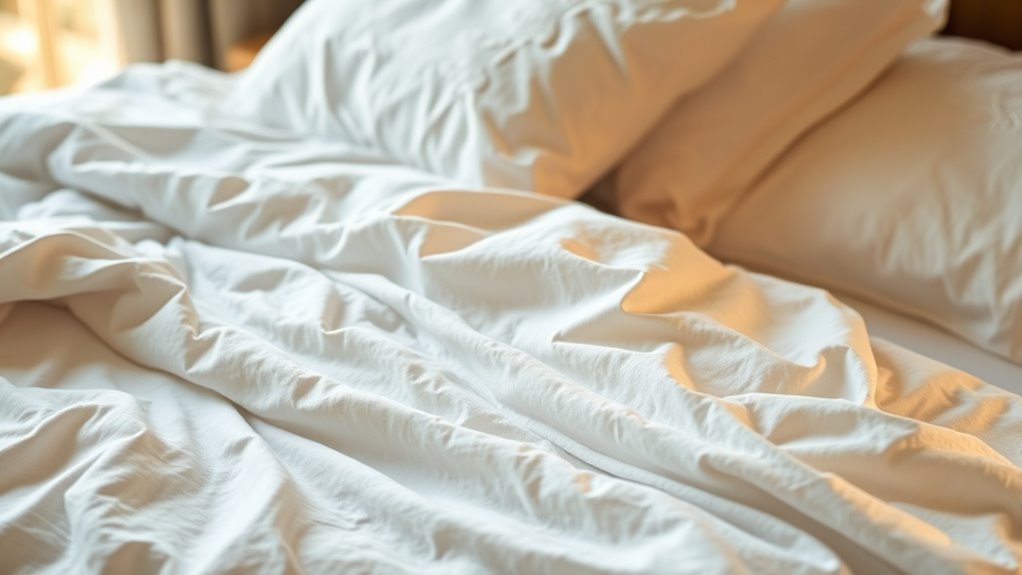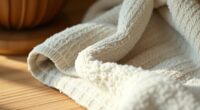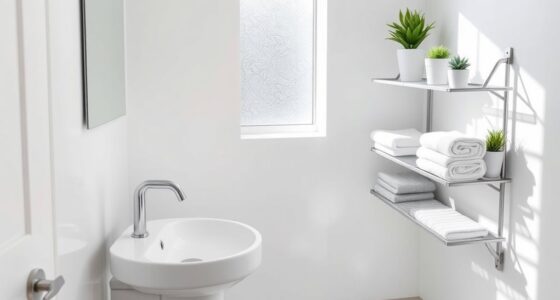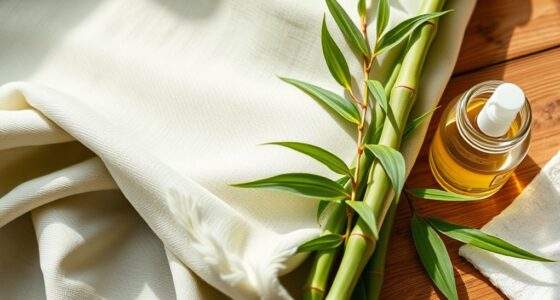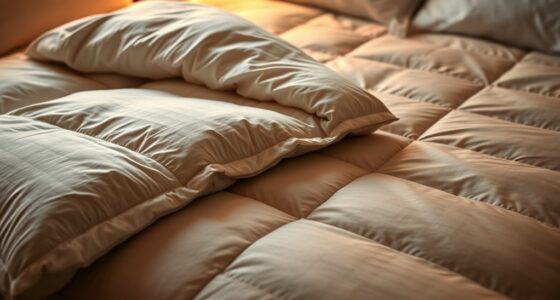Focusing only on thread count can mislead you into buying rough, quick-pilling sheets or synthetic fabrics that don’t breathe well. Instead, pay attention to fiber quality, like fibers from Egyptian or Pima cotton, which feel softer and last longer. Weave type also matters—percale or sateen affect how your sheets feel and breathe. By understanding these factors, you’ll find sheets that are truly comfortable and durable. To discover what really makes a great sheet, keep exploring this topic further.
Key Takeaways
- Higher thread count doesn’t guarantee softness or quality; fiber quality and weave style are more important.
- Natural fibers like Egyptian or Pima cotton provide better softness and durability than synthetic or inflated thread counts.
- Weave types, such as percale or sateen, significantly affect feel, breathability, and suitability for different preferences.
- Breathable, moisture-wicking properties depend on fiber type, not just thread count; natural fibers excel here.
- Focus on fiber quality, weave, and craftsmanship rather than solely on thread count to choose high-quality sheets.
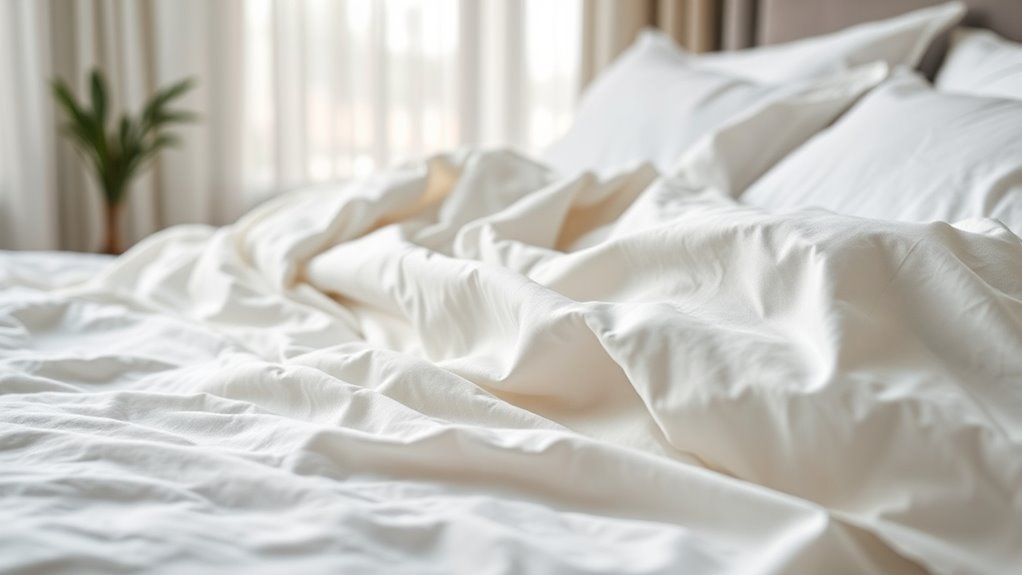
Have you ever been told that a higher thread count automatically means better sheets? If so, you’re not alone. It’s a common belief that more threads per square inch translate to softer, more luxurious bedding. But that’s a trap. Thread count alone doesn’t tell the whole story about sheet quality. In fact, focusing solely on it can lead you to buy sheets that feel rough, pill quickly, or don’t last as long as you’d like.
Higher thread count doesn’t guarantee softer, better sheets—fiber quality and weave matter more.
What really matters is the quality of the fibers and how they’re woven. High-quality cotton, like Egyptian or Pima, produces softer, more durable sheets even at lower thread counts. Conversely, sheets with extremely high thread counts—say, over 600—are often made by tightly weaving multiple threads together or by adding synthetic fibers to inflate the count. These sheets can feel stiff or slick, not soft and breathable, which defeats the purpose of comfortable bedding. Remember, a sheet with a thread count of 300 made from long-staple cotton will outperform a cheaply made 800-thread-count sheet with inferior fibers.
The type of weave plays a pivotal role too. Percale and sateen are common options, each with distinct feels and benefits. Percale, with its tight, plain weave, offers a crisp, cool touch perfect for hot sleepers. Sateen, woven with a satin finish, feels silky and smooth, ideal for those who want a luxurious feel. Both can have a wide range of thread counts, but the quality still depends on the fibers and how the fabric is woven. A higher thread count doesn’t automatically mean a better weave or a softer sheet.
Breathability and moisture-wicking properties are also essential. Natural fibers like cotton, linen, and bamboo excel here. They help regulate your body temperature and prevent sweating during the night. Sheets made from synthetic fibers or blends might boast high thread counts but often trap heat and moisture, leading to discomfort. So, don’t be seduced by the number on the label. Instead, look for sheets made from quality natural fibers, pay attention to the weave, and consider how they feel against your skin.
In addition, the fiber quality greatly influences the durability and softness of your sheets over time. In essence, the true measure of good sheets isn’t just how many threads are woven into them but the quality of those threads, the type of fibers, and the craftsmanship behind the weave. Don’t fall for the thread count misconception. Focus on what feels good, lasts long, and suits your needs. That’s what really matters in choosing bedding that brings comfort and satisfaction.
Frequently Asked Questions
How Does Fiber Quality Affect Bedding Comfort?
Fiber quality directly impacts your bedding comfort by determining softness, durability, and breathability. High-quality fibers, like long-staple cotton or premium silk, create smoother, more luxurious sheets that feel gentle against your skin. They also resist pilling and wear better over time. Lower-quality fibers may feel coarse, wear out quickly, and cause discomfort. So, choosing bedding made from superior fibers guarantees a cozy, lasting sleep experience.
What Alternatives to Thread Count Indicate High-Quality Sheets?
When shopping for high-quality sheets, look at fiber quality, ply, and weave type instead of just thread count. For example, 100% long-staple cotton or linen indicates durability and softness. A percale or sateen weave also suggests better breathability and a luxurious feel. These factors often matter more than thread count alone, with a lower count of around 200-400 often outperforming higher, cheaper options.
Does Thread Count Impact Sheet Durability Over Time?
Yes, thread count can impact sheet durability over time, but it’s not the only factor. Higher thread counts often mean stronger, tighter weaves, which last longer. However, quality materials and proper care matter just as much. You should focus on choosing sheets made from durable fabrics like long-staple cotton or linen, and follow washing instructions. This approach guarantees your sheets stay soft, strong, and comfortable over the years.
Are Higher Thread Counts Always More Expensive?
Higher thread counts aren’t always more expensive, but they often are. You might find luxury sheets with very high counts, which can drive up the price. However, cost also depends on fabric quality and brand. Instead of just chasing high thread counts, focus on the material and weave. You’ll get better value and comfort by choosing well-made sheets, regardless of their thread count.
How Should I Choose Sheets Based on Climate and Season?
Think of your sheets as your climate’s best ally. For hot summers, choose lightweight, breathable fabrics like linen or cotton with a low thread count—they wick away sweat and keep you cool. In winter, opt for thicker, insulating materials like flannel or higher thread count cotton that wrap you in cozy warmth. Always match your sheets to the season’s mood, so you sleep comfortably no matter the weather.
Conclusion
Don’t be fooled into chasing high thread counts like the sirens of old. Remember, as in Homer’s tales, true value isn’t just in the surface shine but in the quality beneath. Focus on the weave, the material, and your comfort—those are the real treasures. So next time you shop, look beyond the hype and trust your senses. After all, even Odysseus knew it’s what’s beneath the surface that truly counts.
